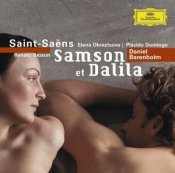While the overture has always been a perennial concert favorite, and the symphony has always been admired, the opera has had an unfair share of detractors and critics, even during the composer’s lifetime. The opera, conceived in 1867, was premiered at Weimar in 1877, through the influence of Saint-Saëns’ friend, Liszt, and it would not be staged in the composer’s homeland until 1890. Upon closer scrutiny into the composer, one can see that the opera mirrors Saint-Saëns’ personal situation and the political struggle in France during the composer’s youth. In addition, the character of Dalila is a composite of three very influential, at times detrimental, women in the composer’s life: his mother Mme. Saint-Saëns, the singer Pauline Viardot to whom the opera is dedicated, and Augusta Holmes.
In Samson et Dalila, Saint-Saëns presents a tightly woven and seamless score from which not one note can be spared, not one instrument or voice is miscast, and no situation in the libretto not perfectly matched to the score. Saint-Saëns’ music is at times heroic, seductive, compassionate, and spiritual. The Bacchanale, the most criticized part of the work, is an orgy of sound and decadence mixed with Samson’s cry for redemption—a fitting end to the opera.
This two CD set is a budget re-issue originally recorded in July 1979, following a performance at the Théátre Antique National d’Orange. There are many worthy moments in this recording as well as some minor flaws, and the three principals, Domingo, Obraztsova, and Bruson, give a valiant and exciting performance.
Domingo, who still sings this role, had not yet developed the excessive nasal tone which would later plague him, and at the time of this recording he gave the leading character a youthful vigor and naiveté not usually found in other interpreters. Most appealing is his Act II interaction with Dalila, “En ces lieux, malgré moi…” and the Act III prayer like “Vois ma misère, hèlas.”
Unlike Voltaire’s character for Rameau’s opera on the same subject, Fernand Lemaire’s Dalila does not lust for the Biblical hero; instead, she uses her sex and allure as a weapon against the weaker Samson. This Dalila is strong, determined, and vengeful. As such, Russian mezzo-soprano Obraztsova, among her many roles, an excellent Amneris and
Azucena, would at first glance seem a good choice for this opera; her instrument is sharp without being edgy, at times careless without being unpleasant, and always exciting, but as Dalila, not always parallel to the sensuality in the music. Her rendition of “Printemps qui commence... ” is very deliberate rather than seductive or alluring; and in the opening monologue of Act II, “Samson, recherchant ma presence…” her diminuendo and chest notes are ineffective and out of character. These minor pecadillos are later redeemed in her scenes with the High Priest, “J’ai gravi la montagne…oui…déjá par troi fois…” and with Samson, “En ces lieux, malgré moi…Mon cœr s’ouvre a ta voix…Mais! Non! Que dis-je, hélas…,” and later in Act III, “Salut! Salut au juge d’Israël…Glorie à Dagon vainqueur…” following the Bacchanale.
Of the three principals, Bruson seems the least comfortable singing in French (followed by Obraztsova) but the unmistakable sound of his instrument redeems him, in particular during the scene with Dalila Act II, “J’ai gravi la montagne…Oui déjà par trios fois…,” and in Act III “Salut! Salut au juge d’Israël…Glorie à Dagon vainqueur…”
The chorus, essential to this opera, is credible—the voices always in unison, well-rehearsed, and excellently handled by Oldham. Of the supporting cast, Pierre Thau, as Abimélech, and Rober Lloyd as the Old Hebrew make the best of their respective roles, though they both sound rather detached.
The Orchestre de Paris is in top form, and is served well by Argentinean conductor Daniel Barenboim. He lavishes attention to the score, and treats every instrument as a soloist with the desired effect of the listener being able to individually, and continually hear all the notes and subtleties in the music, including those in the more complex ensembles. The deliberate pauses in the score are faithfully adhered to, and further emphasize the drama in the music. One minor comment to Barenboim’s conducting is his slow approach in several key passages, which shifts the emphasis of the music and the singing from religious fervor to a “lullaby” (Dieu! Dieu d’Israël), and from seductive to “elegant” (Printemps qui commence, Danse des prétresses de Dagon)—robbing the listener from an otherwise careful, energetic and flawless performance. Likewise, the interlude prior to Dalila shearing Samson’s hair is chillingly effective, as is Dalila’s “Mon cœr s’ouvre a ta voix,” the introduction to, and Samson’s Act III aria, “Vois ma misère, hèlas,” the much maligned Bacchanale, and others.
Overall this is a good recording to own. However, one word of caution: the budget reissue does not provide a libretto, and the breaks between the tracks are, more than once, sufficiently noticeable to be unpleasant.
Daniel Pardo 2005
